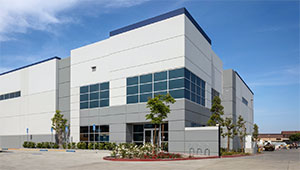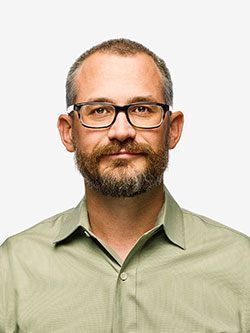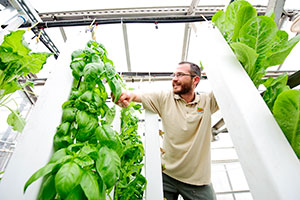
Ten years ago, Nate Storey was nearing the completion of a Ph.D. in agronomy from the University of Wyoming while working to develop a new company with the bold objective of revolutionizing the way produce is cultivated and sold. He and a partner had just won the UW College of Business entrepreneurship competition, receiving $12,500 to help start their company and one year of free business counseling services and space at UW's business incubator.
Today, Storey is the chief science officer of Silicon Valley startup Plenty Inc., which acquired his company, Bright Agrotech, in 2017. Plenty soon will open the world's highest-output, vertical, indoor farm in Compton, Calif. -- a major step for a new industry that is gaining increasing attention for its ability to supply high-quality produce year-round using relatively small amounts of water and land, and without the use of pesticides. Recently, Walmart announced it has taken a stake in Plenty, becoming the first large U.S. retailer to significantly invest in indoor vertical farming as a way to deliver fresher produce to its stores.
It has been an amazing decade-long journey for Storey, who still lives with his family in Laramie while traveling frequently to California for his job. He says his success shows that a good idea, early-stage support, intense effort, persistence and a willingness to learn and adapt make it possible for UW graduates to achieve their boldest ambitions.
"When we competed in the first $10K (competition), we didn't even really have a business at that point -- just a concept with some work behind it," Storey says. "Over the next couple of years, we built a business and got a crash course in how businesses work, how you set things up, how you manage people, taxes, overhead and compliance -- all of the work that comes with starting a business. Since then, a lot has happened."
It certainly has.
Getting Off the Ground
Bright Agrotech emerged from UW's business incubator in 2015 and established an indoor farm in Laramie, using vertical towers and other technology Storey developed and patented under license with the university. The company grew quickly, generating several million dollars in annual revenue and employing several dozen people.
"I started to realize that Bright Agrotech was incapable of having the impact I'd hoped for on the food supply," Storey says. "I was thinking about that problem when I ran into some guys from California who said they had the same idea for a food production business and liked our technology. They said, 'Why not join us?'"
So, Storey joined Matt Barnard and Jack Oslan to co-found Plenty, handing off Bright Agrotech to partner Chris Michael. Subsequently, Plenty's acquisition of Bright Agrotech folded in Storey's patents and original equipment "to consolidate that technology."
The Laramie operation remains and serves as Plenty's research and development farm, employing about 80 people. Michael is now Plenty's senior internal communications manager.

It has taken much more work in Laramie and at Plenty's flagship farm in South San Francisco to take Bright Agrotech's technology and develop it for large-scale application.
"We've gotten great traction with Plenty, but we have had hard technical problems to solve, and it's complex from a business standpoint also," Storey says. "No one in the world had a vision for these things. Developing that vision has required contact with the laws of physics, markets and customers.
"By and large, the bones of Bright Agrotech are still there. We started off on this quest to bring fresh, healthy local food to everyone. We thought we knew how to do that," he adds. "The technologies and methodologies are the same, but the approaches have shifted in response to things we learned as we went through the process. We generally were right; what's changed in the last decade is the best approach to do it."
'A Giant Learning Experience'
Storey describes the last 10 years as exhausting -- "a decade of no sleep, of hundred-hour work weeks, of selling and pitching."
"It has required me to learn a lot of things -- finance, raising money, markets and politics -- things I wasn't contemplating at the beginning. It's been just a giant learning experience. That's the nature of building these types of things," he says. "I've been able to occupy a unique position through this journey. I'm not a business major. I'm not a Stanford graduate or a lot of things people think you need to be to succeed in technology. It turns out that you don't have to be that smart -- just have good ideas, be willing to work real hard and not sleep a lot."
Plenty has raised nearly $1 billion for its next steps, and the first step is monumental: opening the 95,000-square-foot indoor farm in Compton, which is expected to deliver its first produce in October to Walmart stores in California.
"This is the largest, most automated indoor farm in the world, by a long shot," Storey says. "It contains a lot of the technology that we've worked really hard to develop at Plenty, a lot of the technology that represents the first steps to creating an entirely new form of agriculture. It's something we're all very excited about, even as we're still in the rush and chaos of building it. It represents a lot of incredible work by a lot of incredible people."
Plenty says its vertical farming towers are designed to grow multiple crops on one platform in a building the size of a big-box retail store. Its systems feature vertical plant towers, LED lighting and robots to plant, feed and harvest crops -- using 1 percent of the land that an outdoor farm requires while delivering anywhere from 150 to 350 times more food per acre. The vertical farms are intended to supplement, but not replace, traditional farming practices while helping increase the food supply in a sustainable way.
What is the ultimate aim of the company?
"Plenty is going to be building many of these farms. These farms are very sophisticated assets that bring jobs to communities," Storey says. "We are going to grow pretty meaningfully over the next few years to become a global ag production and technology business. As we grow, add new crops and invest in improving technology, we will see growth in our science team in Laramie as well."
Incubating Success
Storey's success is exactly what UW had in mind when it launched the Wyoming Technology Business Center, now IMPACT 307, says Fred Schmechel, the incubator program's interim director. The university is augmenting its efforts to boost business startups with the launch of the Wyoming Innovation Partnership and the Wyoming Center for Entrepreneurship and Innovation, in conjunction with the state's community colleges, the Wyoming Business Council and others. Plans call for establishment of IMPACT 307 incubators in communities around the state, in addition to the existing ones in Laramie, Casper, Cheyenne and Sheridan.

"Nate's story is a great example of how the university helps students and faculty develop ideas and then take them to the marketplace," Schmechel says. "His story is particularly impressive, but a number of our incubator clients have gone on to become successful businesses in the state and beyond as well."
Storey credits former UW business advisers Christine Langley and the late Jon Benson for helping him take his patented technology to the marketplace and surmount the challenges to launching a business.
"I still tell folks that Christine is the most influential person in my life, from a business mentorship standpoint. I will forever be in her debt -- Jon Benson, too," Storey says. "They were incredibly patient and wise. I'm super grateful."
What advice does he have for UW students who aspire to make their mark, as he has done, in places like Silicon Valley?
"If you grow up in Wyoming and go to a place like Silicon Valley or Los Angeles, you're going to be faced with a series of questions you have to ask yourself, such as 'Who am I? Who am I in relation to the people around me?,'" says Storey, who graduated from high school in Cheyenne. "It's a challenge when you go to a place like Silicon Valley. There are a lot of smart people who know what they're doing and have experience you don't have. You have to be honest about what you know and don't know, and then be willing to learn. Still, you can be confident that the education and things you learned at UW are applicable in other places, and that you're as smart as anyone else. I wish I had been more confident early on."
The success of Bright Agrotech and Plenty, with its continuing presence in Laramie, shows the potential for further economic progress in Wyoming, he adds, emphasizing the need for affordable workforce housing.
"We're building a company that leads the world in this area of high technology. Not a lot of companies in Wyoming can say that," he says. "Laramie and Wyoming are in a special spot. The state is going to grow. It can grow chaotically, or we can embrace the growth, plan ahead and prepare the state for its next phase of economic growth and evolution. If we do it right, the next decade can be even better than the last one."






